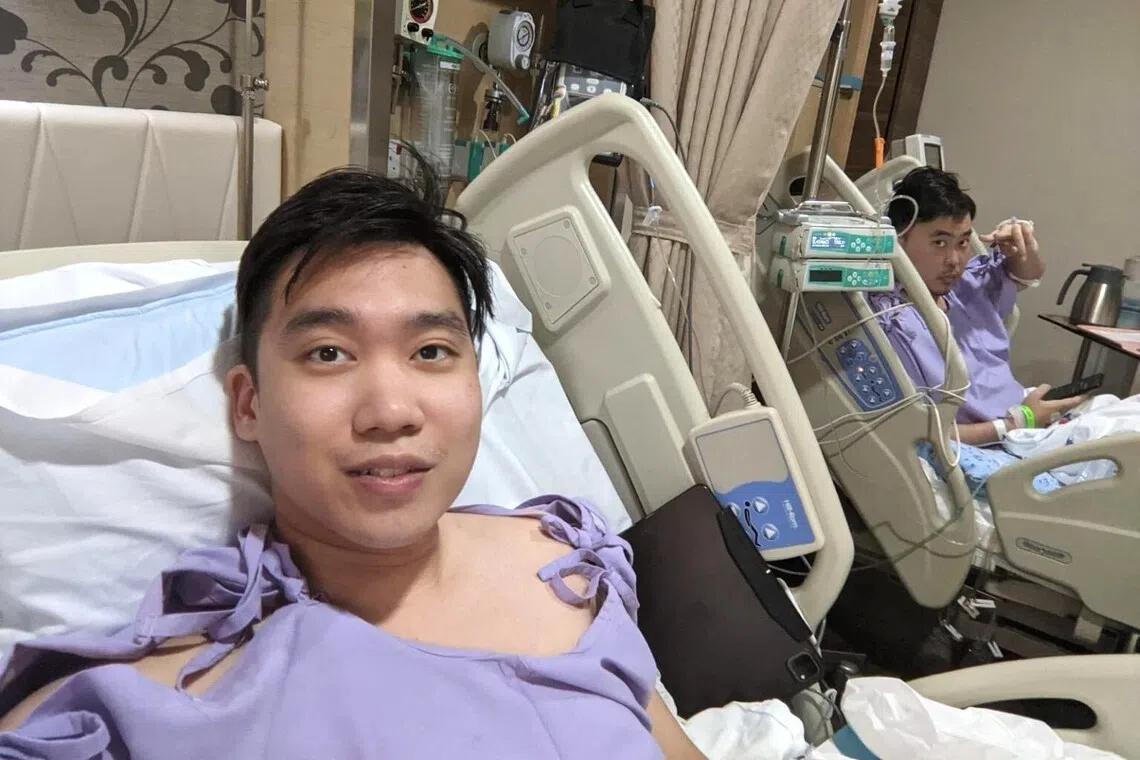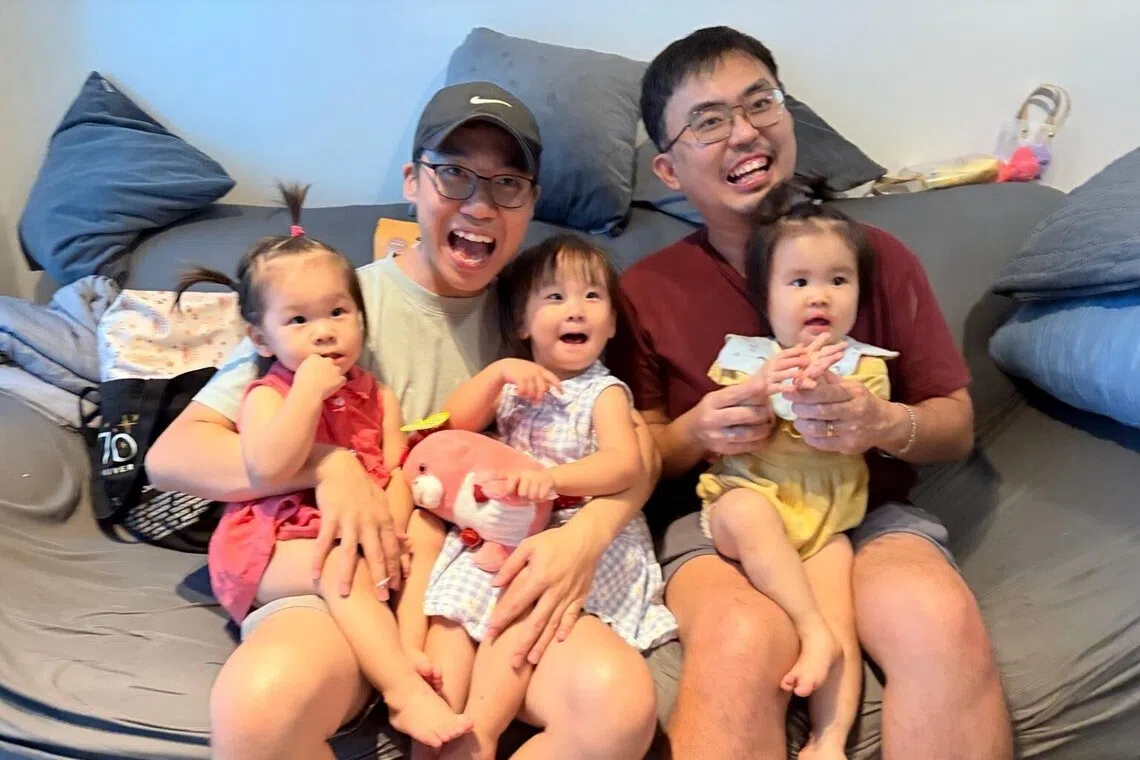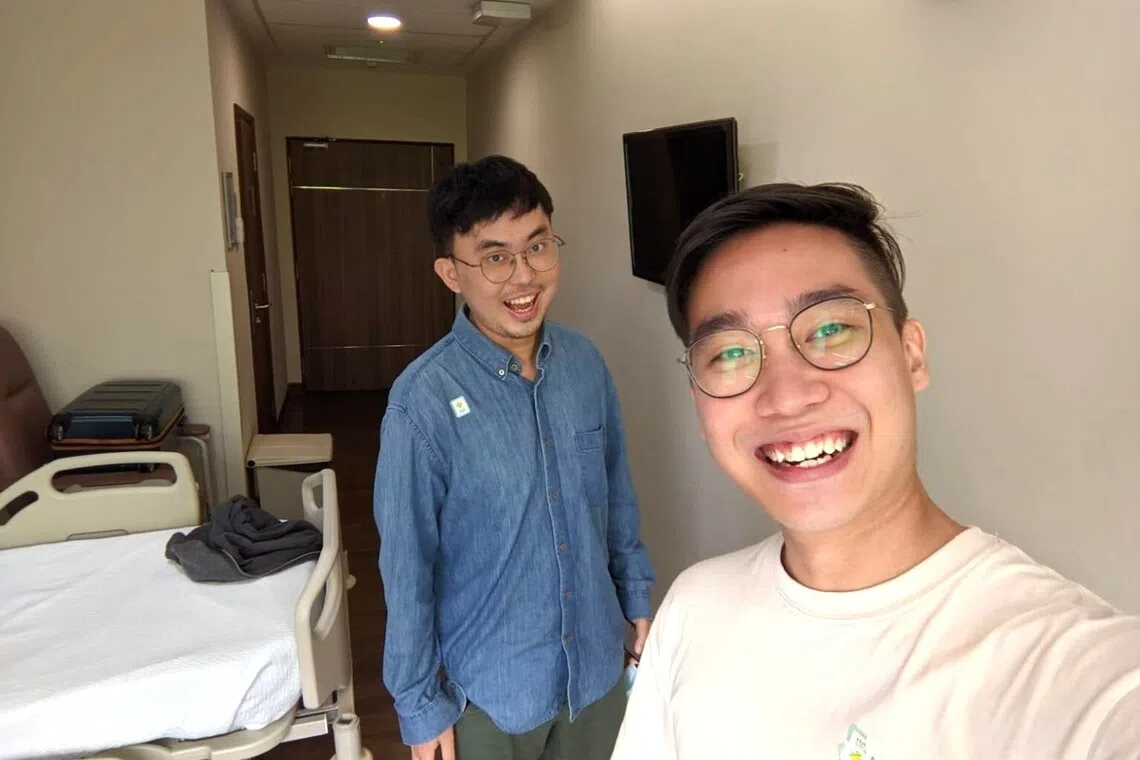Branded content
From sharing tangyuan to a kidney: How a workplace friendship led to a life-saving organ transplant
Two audio engineers who bonded over music and humour now share an even deeper connection after one donated a kidney to the other at Mount Elizabeth Hospital

Mr Tew (left) recovering at Mount Elizabeth Hospital together with Mr Pang, post-surgery.
PHOTO: MOUNT ELIZABETH HOSPITAL
Follow topic:
When Mr Tew Jian En’s phone rang that day in 2021, his friend Mr Pang Jinghui was on the other end. He needed a kidney transplant.
Mr Tew’s answer came without hesitation: “Yes.”
The two had met six years earlier as audio engineers, bonding over their shared sense of humour and love of music. What began as a workplace friendship had deepened over time. Mr Pang, knowing his Malaysian colleague was living alone in Singapore, invited him to spend the winter solstice with his family, sharing tangyuan together.
“I wanted to provide some form of comfort for my friend,” says Mr Pang, 36.
Even after they moved on to different jobs, the pair stayed close, checking in regularly on each other’s lives.
But Mr Tew, 32, had also watched his friend’s health decline. Between 2017 and 2021, Mr Pang’s kidney function dropped sharply – from 50 per cent to below 40 per cent – requiring increasingly intense treatments including steroids. The visible toll was clear: mood swings, nausea, severe water retention and gout.
Mr Pang had been living with chronic kidney disease since his teens. A National Service pre-enlistment screening at age 18 revealed IgA nephropathy, an autoimmune disease that attacks the kidneys. For years, the condition remained manageable and mostly asymptomatic. But that was changing.
“As the months went by, I saw it going below 40, 50 per cent – I knew the time would come when I would need a transplant. Finally, it was time to face reality,” says Mr Pang.
When that call came, Mr Tew didn’t need time to think.
“I had lost a sister to leukaemia, so I could understand how Jinghui’s family must be feeling and I wanted to help,” he recalls.
A moment of doubt
Just as he was about to be wheeled into the operating theatre, Mr Tew’s phone rang. It was his wife who told him, “I’m pregnant.”
The news made him pause, but only for a split second. He went ahead with the operation.
The transplant, performed by Dr Adrian Liew, a nephrologist at Mount Elizabeth Hospital, was successful. Mr Tew’s kidney now works in Mr Pang’s body. And both men went on to become fathers – Mr Tew to two daughters, now aged four and two, and Mr Pang to his own child two years after the procedure.

United by more than a transplant, Mr Tew (left) and Mr Pang now get to embrace and enjoy fatherhood.
PHOTO: MOUNT ELIZABETH HOSPITAL
A pressing need
Mr Pang’s situation reflects a broader challenge in Singapore. According to Dr Liew, the National Kidney Foundation reports about six new end-stage kidney failure cases daily in the country. Between 2021 and 2022, approximately 13.8 per cent of Singapore residents aged 18 to 74 had chronic kidney disease.
As kidneys lose function and waste matter builds up, patients can experience the symptoms Mr Pang endured, as well as difficulty breathing, anaemia and even breath that smells like ammonia, according to the National Kidney Foundation.
While dialysis is available, Dr Liew highlighted that a kidney transplant, when suitable, offers the best treatment option, in terms of survival and quality of life.
“While dialysis takes over some part of the kidney function, it does not take over the function of a native kidney totally and often toxins are not removed completely from the body. These toxins continue to put the patient in a constant inflammatory state and coupled with the cardiovascular risks associated with dialysis, increase the risk of cardiovascular complications in dialysis patients” he says.
The waiting time for a deceased donor kidney is long and outcomes after transplant are worse with a longer time on dialysis, which is why younger patients with kidney failure would benefit greatly in receiving kidneys from living donors, he adds.
The transplant process
Mr Tew and Mr Pang underwent a living donor kidney transplant, where the donor must be either biologically or emotionally related to the recipient.
Dr Liew explains that both parties – and their families – receive thorough counselling about the procedure and long-term follow-up. They undergo medical and psychological evaluation to ensure everyone understands what lies ahead.

Mr Pang (left) with Mr Tew at Mount Elizabeth Hospital to prepare for their transplant procedure.
PHOTO: MOUNT ELIZABETH HOSPITAL
“To be eligible as a living donor for kidney transplant, the individual must have a good kidney function and no risk factors for kidney disease, so that the risk of them developing kidney failure after the transplant is kept to a minimum,” says Dr Liew.
Post-surgery, the donor typically spends a few days in hospital and recovers within 1-2 weeks, while the recipient stays longer and begins medication to prevent rejection of the new kidney.
In this case, Mr Pang had insurance that covered the operation and some associated costs, including some of donor Mr Tew’s bills.
Life after transplant
The impact was almost immediate for Mr Pang: his gout disappeared after the procedure.
There are other adjustments. Mr Pang remains on immunosuppressants to prevent his body from rejecting the kidney. He avoids undercooked food to reduce the risk of food poisoning and wears a mask in crowded places to lower the chances of getting sick.
Mr Tew has been advised to avoid high-impact contact sports that could injure his remaining kidney.
“Otherwise, they can continue living a normal life,” says Dr Liew, adding: “Both of them are doing well and have good kidney function.”
The two friends stay in regular contact with Dr Liew and have full access to his advice. Even simple medications for a cold can interact with Mr Pang’s post-transplant drugs, so having direct access to their doctor provides a peace of mind.
The bond between the two families has only strengthened. They spend time together regularly, with outings and visits to each other’s homes where their children play together.
Says Mr Pang: “You never know who in your life that you cross paths with will become like a brother to you. I am very touched by what he did for me.” Learn more about living donor kidney transplants.


